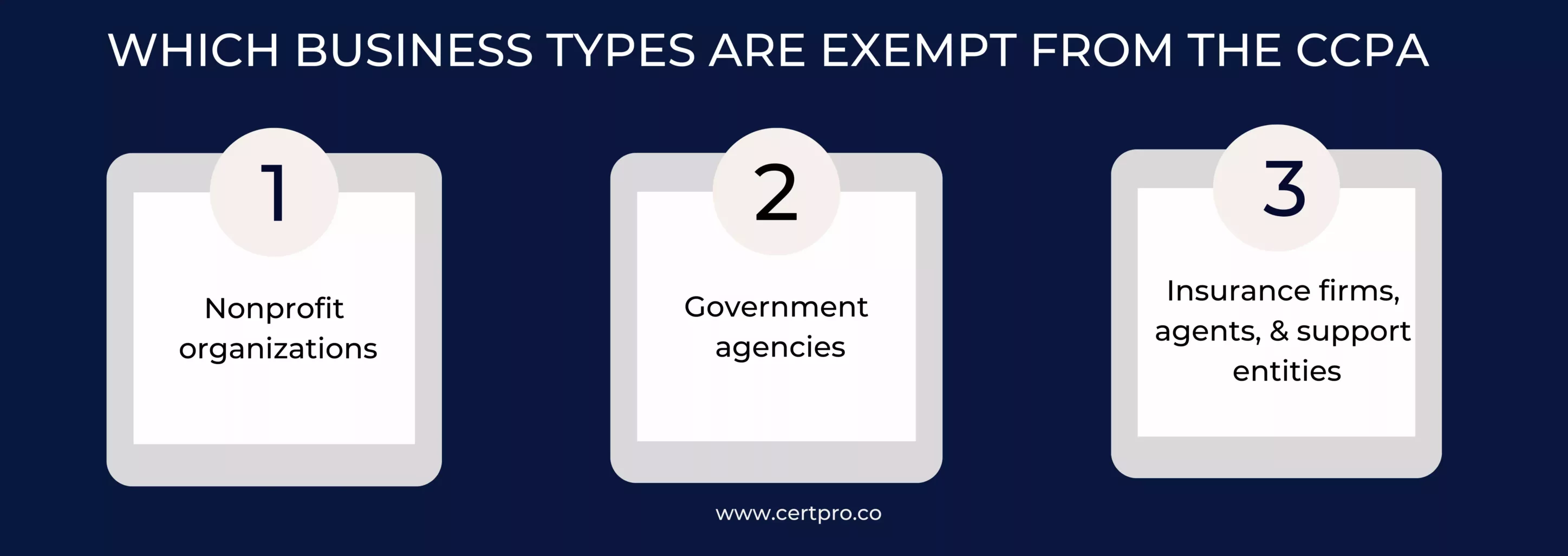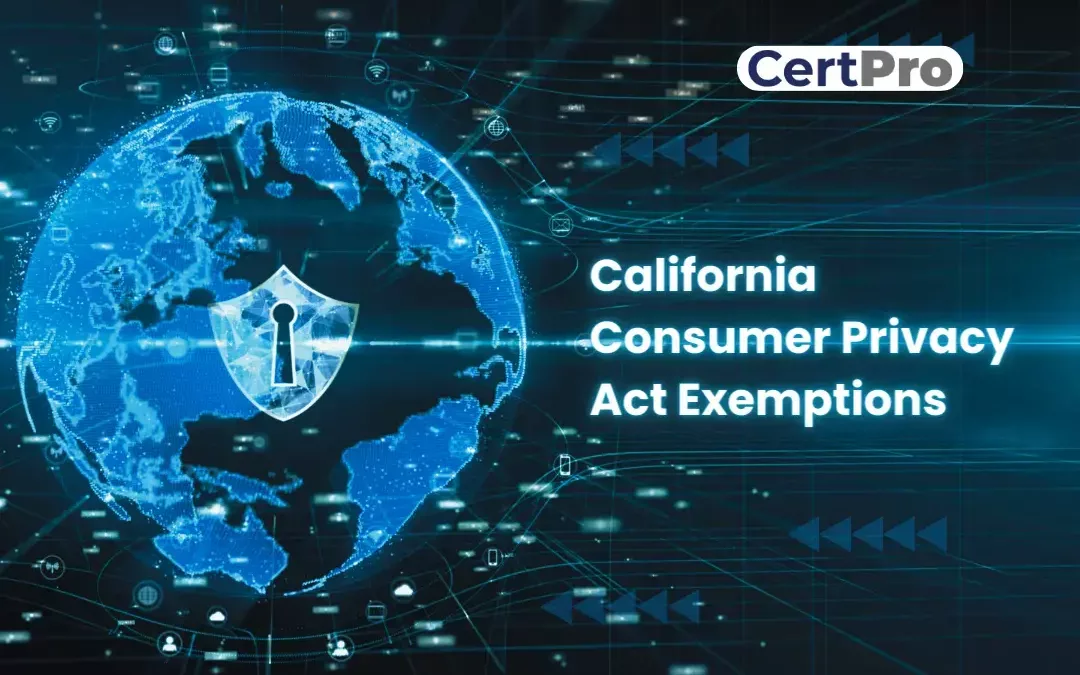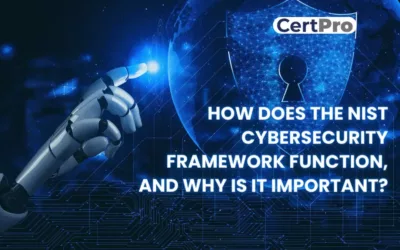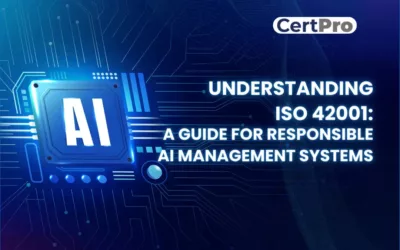In today’s world, safeguarding customers personal information has become a worry for individuals and businesses. To tackle this matter, different states have implemented data privacy laws that aim to protect the data of their residents. One notable example is California, a center of activity with numerous businesses, which has introduced the California Consumer Privacy Act (CCPA). This legislation is widely acknowledged as one of the state’s data privacy regulations.
While the CCPA provides Californians with strong data privacy protections, it is critical to recognize the existence of CCPA exemptions and limits. In this blog article, we will go over the CCPA requirements and exemptions in depth, focusing on specific issues that fall outside the scope of this California data privacy law. Our goal is to give you a thorough grasp of the law’s reach and its ramifications within the context of data privacy laws in California.
WHAT IS THE CCPA?
Before we get into CCPA exemptions, it’s important to understand the California Consumer Privacy Act and its implications for California residents. This ground-breaking legislation grants Californians a variety of personal information rights, including.
The Right to Know: Under the California Consumer Privacy Act (CCPA), individuals have the authority to request that businesses provide detailed information regarding the personal data they gather, trade, or distribute concerning the requesting individuals.
The Right to Opt-Out: Consumers have the right to refuse the sale of their personal data, giving them more control and choice over how their data is used and shared by businesses and organizations.
The Right to Delete: Consumers have the authority under the CCPA to request that firms delete their personal data from company databases, highlighting the significance of individual control and data protection.
The Right to Non-Discrimination: When consumers opt to exercise their privacy rights under the CCPA, businesses are banned from treating them unjustly or differently. This anti-discrimination component is essential to California’s data privacy legislation.
The Right to Access: The CCPA allows consumers to request access to personal data gathered by businesses. This transparency means that individuals can evaluate and verify the information collected about them, thereby protecting their data privacy rights.
WHICH BUSINESS TYPES ARE EXEMPT FROM THE CCPA?
In light of CCPA requirements and data privacy laws in California, certain categories of entities enjoy CCPA exemptions. These exemptions are valid under current CCPA needs, regardless of whether these companies gather personal information from California residents and meet the necessary requirements stated above. These exempt entities are:
1. Nonprofit organizations: Nonprofit organizations are excluded from the California Consumer Privacy Act (CCPA) since they do not meet the legal definition of a company under the act. This exception recognizes that organizations with charity or public interest goals are distinct from commercial companies subject to the CCPA’s data privacy laws.
2. Government agencies: Due to their legitimate need for personal information for purposes including investigations, subpoenas, summonses, and compliance with national, state, and municipal laws, government organizations are also excluded from the CCPA. The phrase “government agency” is fairly broad and could refer to public educational institutions as well as federal, state, and local government organizations.
3. Insurance firms, agents, and support entities: Certain entities subject to other regulatory rules are excluded from the CCPA. This exception applies to insurance institutions, agents, and support organizations covered under the Insurance Information and Privacy Protection Act (IIPPA) of California.

CCPA EXEMPTIONS:
The data privacy laws in California, specifically the California Consumer Privacy Act (CCPA), provide California residents with substantial control over their personal information. However, there are critical exemptions to the CCPA requirements. This article will go into various CCPA exemptions, offering insight into places where the law does not apply. Understanding these constraints is critical in the context of data privacy in California.
1. Small Businesses: The CCPA applies to businesses that meet certain criteria, such as having an annual gross turnover of more than $25 million or buying, receiving, or selling personal information from 50,000 or more people. Smaller companies may be exempt.
2. Employee Data: Personal information gathered from job applicants, employees, and contractors is exempt from the CCPA. It is crucial to note, however, that employee data may still be protected under other state or federal laws.
3. Personal Information Not Covered by the CCPA: The CCPA broadly defines “personal information” but excludes certain categories, such as publicly available information. For example, information legally obtained from federal, state, or municipal government data is immune from CCPA regulation.
4. Business-to-Business Transactions: Personal information gathered in a business-to-business (B2B) environment, such as information about an employee at a corporate client, is partially excluded under the CCPA. However, some data protection obligations still apply to B2B transactions.
5. Consumer Credit Reports: Personal data gathered for the purpose of creating a consumer credit report, such as credit histories and ratings, is not covered by the CCPA.
6. Legal Obligations: Due to legal or regulatory duties that require information retention for reasons like legal compliance, firms may occasionally be excused from complying with data erasure requests.
7. Publicly Available Information: Data that is accessible through government records or widely disseminated by media sources is exempt from CCPA regulations. This exemption recognizes the importance of open and publicly available information.
WHAT ARE THE CONSEQUENCES FOR BUSINESSES THAT VIOLATE THE CCPA?
The California Consumer Privacy Act (CCPA) is a stringent privacy law that empowers consumers with rights over their personal data. Companies failing to comply with CCPA regulations can face substantial penalties. These penalties can include fines of up to $7,500 for each intentional violation and up to $2,500 for each non-intentional violation. Moreover, non-compliant companies may be subjected to civil lawsuits from consumers whose data privacy rights have been violated. Beyond financial consequences, the reputational damage from non-compliance can be severe, leading to a loss of customer trust and loyalty. To avoid these penalties and safeguard consumer data, businesses must implement comprehensive data protection measures, including data access and deletion requests, transparency in data practices, and maintaining up-to-date privacy policies.
WHICH ORGANIZATIONS ARE REQUIRED TO COMPLY WITH CCPA?
The California Consumer Privacy Act (CCPA) is applicable to any for-profit organization that collects personal information about residents of California and meets one of the following threshold requirements. In order to guarantee CCPA compliance, establishments need to fulfill a minimum of one of the subsequent prerequisites:
1. Exceeds $25 million in gross revenue annually: The $25 million criterion takes into account worldwide revenues as well as those produced solely in California. As a result, the law may apply to national or international organizations that manage the personal data of a small number of Californian citizens.
2. Does business with at least 50,000 customers, households, or devices in the buying, selling, receiving, or sharing of personal data for commercial purposes: The number of personal information records obtained from data brokers, the number of visitors the website received during the previous year, and/or the number of contacts in the company’s Customer Relationship Management (CRM) system are all included in this accumulation.
3. Generates at least half of its yearly income from the sale of personal information: This includes interest-based advertising revenue, like retargeting ads, that goes into the total percentage computation. To determine whether their revenue streams meet this requirement, firms must thoroughly evaluate them.
WHAT TYPES OF DATA ARE EXEMPT FROM THE CCPA?
1. Information about employment: The CCPA allows for a limited exemption for personal information about workers and job candidates where it is collected and used only for the purposes of their positions. However, if a person acts as both an employee and a customer, as in e-commerce settings, all personal information obtained during their customer interactions is subject to CCPA requirements. This dual-role complexity highlights the need for firms to efficiently navigate and adhere to the CCPA requirements.
2. Business-to-Business (B2B) communication: Certain personal information obtained through business-to-business (B2B) contacts is exempt from the California Consumer Privacy Act (CCPA). This exception applies to business-to-business contact information used specifically for due diligence or transactions involving the provision or receipt of a product or service. In certain cases, the CCPA grants a partial exemption when the information pertains to business-related dealings, acknowledging the distinctive nature of B2B communications and their role in due diligence or transactional processes.
3. Personal information is gathered and used completely outside of California: The California Consumer Privacy Act (CCPA) does not apply to activities that take place solely outside of California. Consequently, when a company obtains personal information from a customer outside of California, the CCPA does not encompass that information. Similarly, if personal information is collected while the customer is in California but not intended for sale, the CCPA does not apply. Furthermore, if no component of the consumer’s personal information is sold within California, the CCPA does not apply.
The practical use of this exception, however, raises difficulties because the CCPA lacks precise instructions on how firms should assess whether a consumer is outside of California. Because of this ambiguity, businesses may find it difficult to appropriately analyze and utilize this exception in real-world settings.
4. Other US laws apply to the data: Although the following entities are not totally free from the California Civil Penalty Act (CCPA), some of the data categories they gather might be because of their adherence to other pertinent laws.
- Financial details: Data collected by financial institutions and companies in the financial services sector that are subject to the California Financial Information Privacy Act (CalFIPA) or the Gramm-Leach-Bliley Act (GLBA) are exempt from the California Consumer Privacy Act (CCPA).
- Protected health information: The California Consumer Privacy Act (CCPA) grants an exemption to covered organizations or their business partners when collecting health information that is subject to the Health Insurance Portability and Accountability Act (HIPAA). Furthermore, the Confidentiality of Medical Information Act (CMIA), a parallel California law, exempts medical information from its purview.
- Details of clinical trials: The Federal Policy for the Protection of Human Subjects, often known as the Common Rule, governs biomedical research studies and clinical trials. As such, data gathered in such contexts is exempt from the CCPA.
- Details of consumer reporting: The CCPA grants an exemption for the collection, maintenance, sharing, sale, transmission, or use of personal information covered by the Fair Credit Reporting Act (FCRA), as long as these activities are authorized by the FCRA.
- Driver information: Information processing that complies with the guidelines set forth in the Driver’s Privacy Protection Act of 1994 (DPPA) is excluded from the CCPA.
FAQ
What is the California Consumer Privacy Act (CCPA)?
The CCPA is a data privacy law in California that grants residents specific rights over their personal information, such as the right to know, opt-out, delete, and more.
What are the CCPA exemptions for small businesses?
Small businesses with annual gross revenues below $25 million or those not involved in extensive data transactions may be exempt from the CCPA.
Is employee data covered under the CCPA?
Employee data is partially exempt under the CCPA, but it may still be protected under other state or federal laws.
What categories of personal data are excluded from the CCPA?
The CCPA excludes publicly available information, information from government records, data related to business-to-business transactions, and more.
How can businesses avoid CCPA penalties?
Businesses can avoid penalties by implementing robust data protection measures, responding to data access and deletion requests, maintaining transparency in data practices, and keeping privacy policies up-to-date.

About the Author
SHREYAS SHASTHA DRUPADHA
Shreyas Shastha Drupadha, a Senior Business Consultant. Serving as an ISO 27001 Lead Auditor, Shreyas ensures the establishment of robust information security management systems. His expertise also encompasses GDPR, HIPAA, CCPA, and PIPEDA implementation.
HOW DOES THE NIST CYBERSECURITY FRAMEWORK FUNCTION, AND WHY IS IT IMPORTANT?
Emerging cyber threats make cybersecurity an essential consideration for organizations handling and managing data. In this regard, the NIST cybersecurity framework applies to improving your cybersecurity program. It is a set of guidelines that helps improve your...
UNDERSTANDING ISO 42001: A GUIDE FOR RESPONSIBLE AI MANAGEMENT SYSTEMS
The invention of artificial intelligence (AI) has changed the operational processes of many industries. However, the rapid growth of technology increases ethical, security, and privacy-related concerns. Therefore, the International Organization for Standardization...
EUROPEAN UNION’S ARTIFICIAL INTELLIGENCE ACT: HOW THIS GROUNDBREAKING LAW AFFECTS YOUR BUSINESS
Nowadays, Artificial Intelligence (AI) is transforming our lives exceptionally well. AI is now streamlining healthcare services, providing virtual assistance, and fulfilling queries. Technologies have boons and curses. Similarly, AI creates many concerns about...




